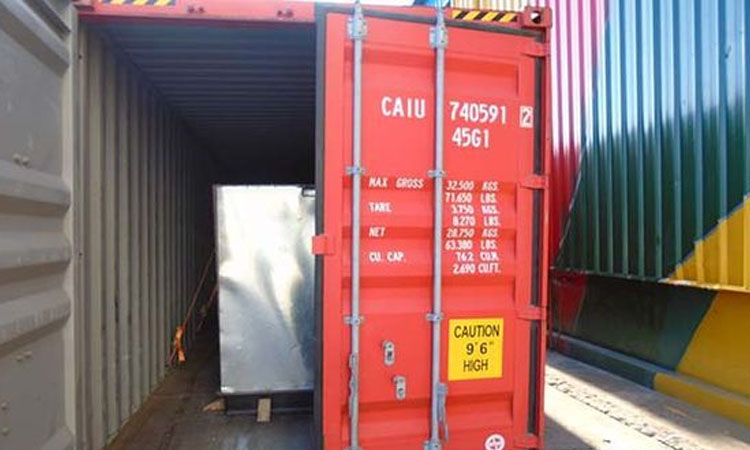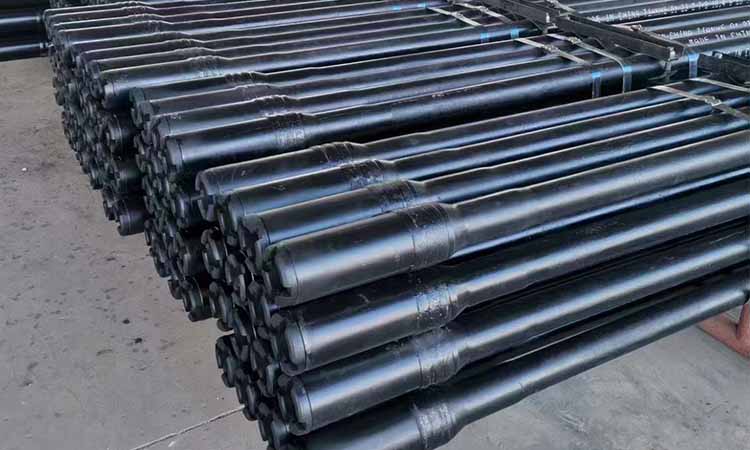Comments of Reciprocating Diaphragm Metering Pump from Overseas
Comments from Australia customer of Sino Mechanial Diaphragm Water Injection Pump
Sino Mechanical offers a 3MDP160-20/20 hydraulic diaphragm high pressure reciprocating pump.It is used to replace the column type reciprocating pump for water injection in 2015. So far, the plunger and plunger packing are not needed to be replaced. It was observed that the surface finish of the column cold was good. There is no visible signs of wear. There is no obvious leakage at the seal with packing. The check valve has only been replaced once and the spring replacement interval is over 4000 hours. The diaphragm has been replaced 3 times, and the power end works normally. The diaphragm water injection pump is currently operating normally. We believe that it has obvious advantages in the service life of wearing parts compared with the plunger type water injection pump. And it can play a relatively large role in reducing operating costs and labor intensity of employees. We suggest that this kind of diaphragm water injection pump be gradually promoted in the oil field.
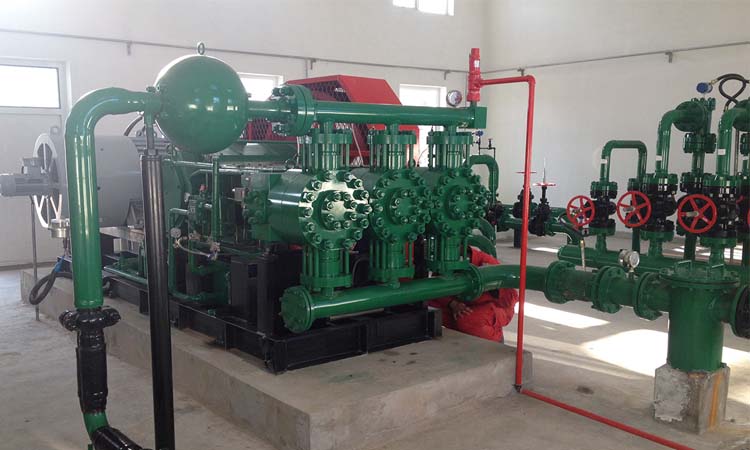
Comments from Malaysia customer of Sino Mechanial Horizontal Three-cylinder Reciprocating Diaphragm Pumps
We purchased three 3MDP120-375/25 horizontal three-cylinder reciprocating diaphragm pumps from Sino Mechanical in June 2018. The rated working pressure of the horizontal three-cylinder reciprocating diaphragm pump is 25MPa, and the rated displacement is 3.75m3/. It is used for liquid metering injection of the project. After being commissioned and put into production in September, all technical parameters meet the technical requirements and are in good use.
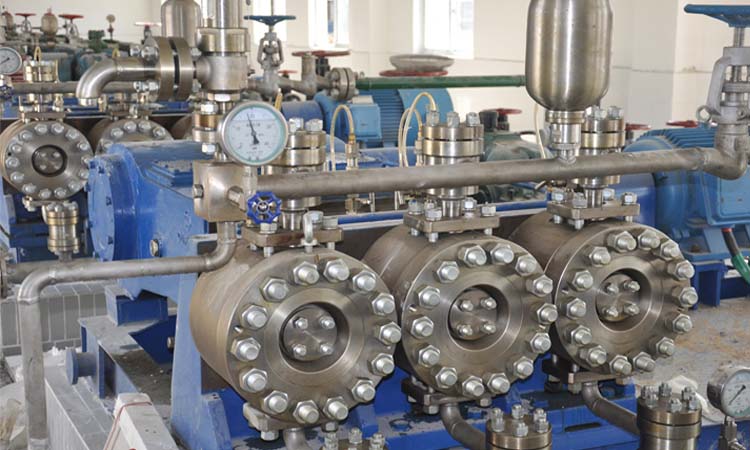
What is a controlled volume pump?
The reciprocating pump is the earliest power machinery developed. It is a type of positive displacement pump. It relies on the reciprocating motion of the piston (or plunger) to periodically change the volume of the pump cylinder working chamber. It then converts the mechanical energy of the prime mover into the pressure energy of the fluid. Controlled-volume (CV) pumps are also known as metering pumps or dosing pumps. They are designed to deliver a small quantity of fluid at a precise rate with relatively high pressure. They are essentially a positive displacement pump of the reciprocating design, but with a more complex design that prevents product leakage.
What is the purpose of a metering pump?
A metering pump is used to add small but accurate volumes of a liquid to other fluid streams or vessels. Metering pumps are also called dosing pumps and proportioning pumps. A metering pump must be able to deliver liquid with an accuracy of greater than 3% across a wide range of discharge pressures.
Outstanding advantage of the reciprocating pump
It can obtain high discharge pressure. And flow is independent of pressure. It has the advantages of good suction performance and high efficiency. The performance of the pump does not change with the pressure and the viscosity of the conveying medium. It is often used to transport liquids with high viscosity, high density, high sand content and high corrosiveness under high pressure, and the flow rate is relatively small.
1) The flow has nothing to do with the lift
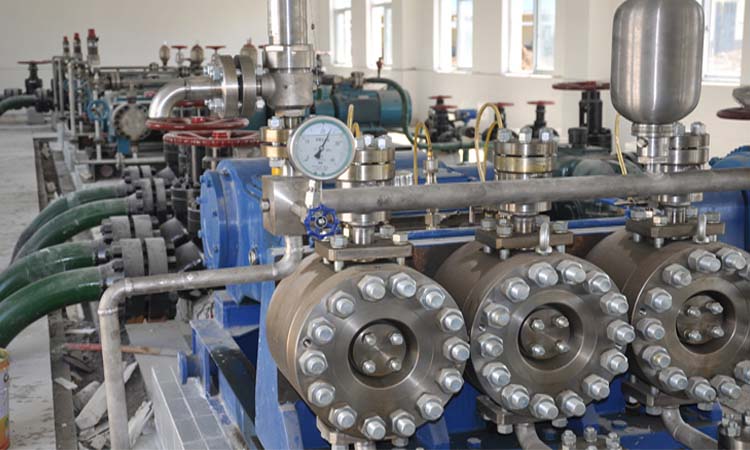
The flow rate of the reciprocating pump is only related to the diameter D of the piston, the stroke S and the number of reciprocations n, but has nothing to do with the lift of the pump. Under any pressure in the discharge pipeline of the reciprocating pump, its flow rate is basically constant. The relationship between the flow rate and the head is basically a straight line. However, at high pressure, the flow rate decreases slightly due to increased leakage losses. Therefore, the reciprocating pump cannot adjust the flow rate by adjusting the discharge valve to change the discharge pressure like a centrifugal pump. In addition, because the flow rate of the reciprocating pump has nothing to do with the discharge pressure, the reciprocating pump is suitable for transporting liquids with relatively high viscosity.
2) With self-priming ability
Before starting, the reciprocating pump does not need to prime the pump like the centrifugal pump, and can suck liquid by itself. But in actual use, it is still desirable that the pump is filled with liquid. On the one hand, it can realize the immediate suction and discharge of the liquid. On the other hand, it can also avoid the dry friction of the piston (or plunger) in the pump cylinder. The self-priming capacity of the reciprocating pump is related to the speed. As the speed increases, not only the liquid flow resistance increases, but also the inertia loss in the liquid flow increases. When the pressure in the pump cylinder is lower than the vaporization pressure of the liquid, it will cause the pump to evacuate and lose its suction ability. Therefore, the speed of the reciprocating pump should not be too high. Generally, the speed of the pump is 80~200r/min, and the suction height is 4~6m.
3) The resulting head can be infinitely high
The head of a reciprocating pump depends on the characteristics of the device in which the pump works. The smaller the opening of the discharge valve, the more difficult it is for the liquid in the pump cylinder to discharge. But the time required for the piston to reciprocate a stroke is approximately constant, and the liquid is approximately incompressible. Therefore, the pressure of the output liquid (that is, the generated lift) is higher. As long as the prime mover has sufficient power, the strength of the pump and pipeline materials is sufficient, and the packing seal has corresponding sealing performance. Theoretically speaking, the discharge pressure of the reciprocating pump can be infinitely high. That is to say, the same reciprocating pump can produce different heads in different devices.
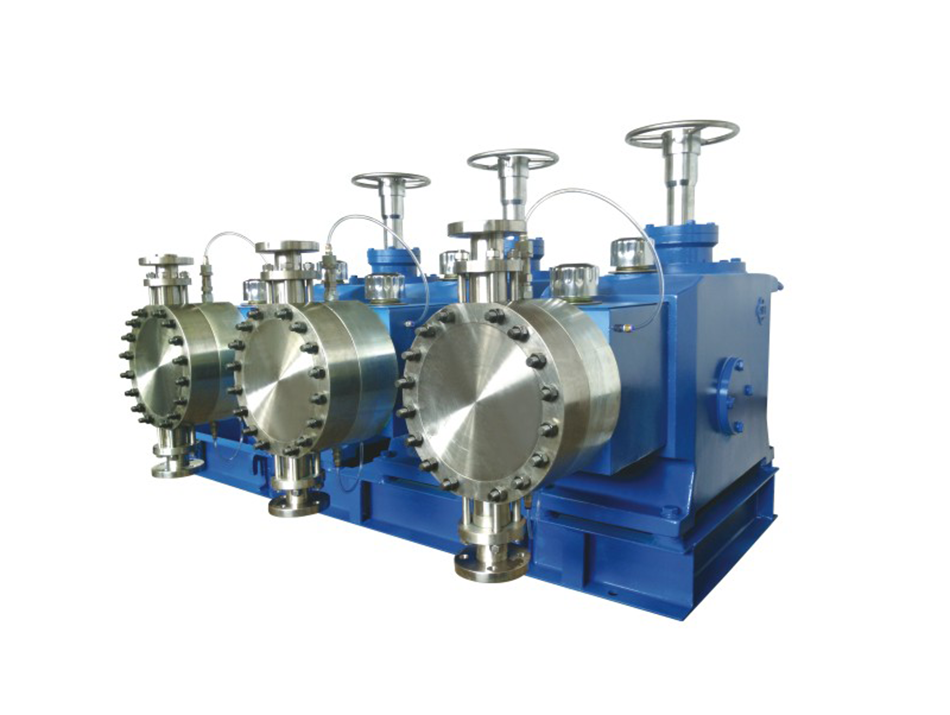
It can be seen from this that reciprocating pumps cannot perform "closed start" like centrifugal pumps. At the same time, from the perspective of safety, a safety valve must be installed in the reciprocating pump device. This can prevent the occurrence of vicious accidents such as "suffocating the pump" due to the blockage of the discharge valve.
4) Can be used as a metering pump
The flow rate of the positive displacement pump depends on the size and frequency of the volume change of the sealed working chamber. When the reciprocating pump is working normally, the flow rate of the pump can be calculated according to the volume of the liquid cylinder and the number of times of reciprocation. By employing various stroke adjustment mechanisms, reciprocating pumps can be used as metering pumps.
5) Uneven flow
The process of suction and discharge of liquid by the reciprocating pump is discontinuous. And what its piston does is variable-speed linear motion. As a result, the instantaneous flow rate is uneven and the discharge pressure fluctuates. The pump is prone to shock and vibration during operation. Especially when the change frequency of the discharge pressure is equal to or an integer multiple of the natural frequency of the discharge pipeline, resonance will be caused. The flow and pressure pulsation of the reciprocating pump will cause uneven load on the prime mover and shorten the service life of the pump and pipeline. At the same time, the pulsation of flow and pressure will also make the suction condition of the reciprocating pump worse. Therefore, the structure of reciprocating pumps often adopts multi-cylinder pumps, double-acting pumps and air chambers to reduce the pulsation of flow and pressure.
At present, the maximum pressure of the reciprocating pump can reach more than 1000MPa. Reciprocating pumps are generally more efficient than centrifugal pumps. Especially the reciprocating pump still has high efficiency under small flow.
Main disadvantages of reciprocating pumps
The main disadvantages of reciprocating pumps are bulky, heavy, complex structure, high cost, and uneven flow.
Price of Reciprocating Pumps
The Reciprocating Pumps Price will change randomly with factors such as production cost, transportation cost, international situation, exchange rate, market supply and demand of raw materials. Sino Mechanical aims to provide you with high quality and best price Reciprocating Pumps. If you are looking for Reciprocating Pumps, please kindly contact us to get the latest Reciprocating Pumps price.
Reciprocating Pumps Supplier
Sino Mechanical, as a Reciprocating Pumps manufacturer, has more than 20 years extensive experiences in the performance, application and cost-effective manufacturing of Reciprocating Pumps. We are global Reciprocating Pumps supplier. We offer a wide range of oilfield equipment and have Reciprocating Pumps for sale. We also provide OEM services. We design, manufacture, and sell Reciprocating Pumps for your applications. If you want to know latest Reciprocating Pumps price, send your RFQ to sales@sinomechanical.com or call us at +8613949215821. We will get back to you within 24 hours.

